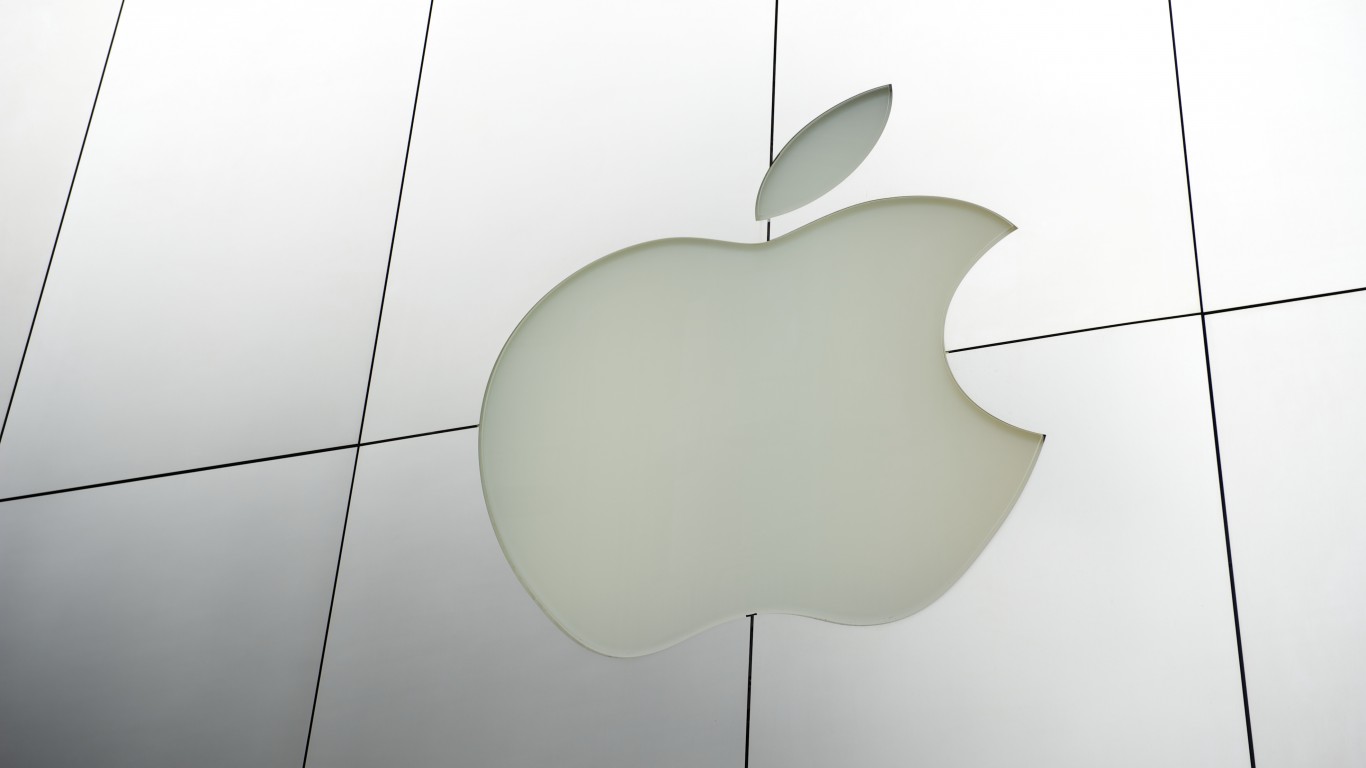
It takes a certain kind of courage to short sell blue chips, such as the Dow Jones industrial average components. Short sellers are betting on these companies to fail, or at least for their share prices to fall handily. Plus, those sellers are responsible for paying the dividends on the stocks they short.
Maybe it is little wonder that only two of the 30 Dow stocks had notable short interest between April 15 and April 30; that is, more than 50 million shares short. In fact, just six of them had short interest of more than 30 million shares.
Yet the bull market is quite long in the tooth — now more than 10 years old — and concern about a coming recession remains despite solid earnings and employment numbers. Investors may wonder then what the short sellers expect from some of the biggest, most well-respected names on Wall Street.
As of the April 30 settlement date, the most recently reported period, short sellers still favored Apple Inc. (NASDAQ: AAPL), Intel Corp. (NASDAQ: INTC) and Pfizer Inc. (NYSE: PFE) above all other Dow stocks.
Apple
> Shares short: 52.67 million
> Change from prior period: −13.7%
> Percentage of float: 1.1
Note that this was even further down from a year-to-date high of almost 97 million Apple shares short at the end of February. The average daily trading volume rose marginally during the final two weeks of last month. Yet, by the most recent settlement date, the number of days it would take for investors to cover all their short positions remained about two.
The maker of iPhones and Macs reported strong quarterly numbers at the end of the month, as well as declaring a dividend. Short sellers watched the share price rise more than 4% yet backslide and end the month with a gain of less than 1%. The Nasdaq climbed almost 2% during those two weeks.
After slipping more than 4% in the past week, Apple stock ended trading most recently at $200.72 a share. That was in a 52-week range of $142.00 (at the beginning of this year) to $233.47 (last October). The share price currently is more than 27% higher than at the beginning of the year.
Intel
> Shares short: 50.53 million
> Change from prior period: −3.0%
> Percentage of float: 1.1
This was on top of a more than 3% decline in the previous period and now is the lowest short interest in at least a year. Note that the average daily trading volume doubled from a 52-week low, and as of the end of last month, it would take about two days for investors to cover all their short positions.
Last month, Intel narrowly exceeded analyst expectations for quarterly earnings, but that was overshadowed by its weak guidance. After rising more than 5% earlier in the period, the April 15 closing share price was about 9% lower than on the previous settlement date, most of that decline coming after the quarterly report. The S&P 500 rose more than 1% in the latter half of last month.
Intel was last seen trading at $46.62 a share, down handily from the multiyear high of $59.59 seen during the short interest period. The 52-week low is $42.36 per share. Note that the latest share price is in the red for the year, while the Nasdaq is up over 19% and the Dow has risen 14% or so.
Pfizer
> Shares short: 47.57 million
> Change from prior period: −26.9%
> Percentage of float: 0.9
This is the fifth double-digit percentage decline in a row, which finally allowed Pfizer to slip from the top spot on the list. Short interest continues to retreat after the almost 265% rise in early January to the greatest number of shares short at Pfizer so far this year. At the daily average volume on the most recent settlement date, it would take about two days for Pfizer short sellers to cover their positions.
Pfizer also posted better than expected quarterly results at the end of the month. That helped the shares recover, to some extent, from a more than 7% retreat earlier in the period. While the Pfizer shares ended down about 2%, the Dow saw a gain of around 1% between the settlement dates.
Shares closed Thursday’s trading at $40.64 apiece, more than 1% lower than a week ago. Pfizer’s 52-week low of $34.89 was seen about a year ago, and the 52-week high of $46.47 was from this past December. The stock now is almost 7% lower than at the beginning of the year.
And the Rest
Rounding out the top six most shorted Dow stocks on the most recent settlement date were Microsoft Corp. (NASDAQ: MSFT), Cisco Systems Inc. (NASDAQ: CSCO) and Exxon Mobil Corp. (NYSE: XOM). While short sellers shied away from the three stocks at the top of the list, these three runners-up saw at least some gain in the numbers of shares short in the period. Of these three, only Microsoft saw a significant increase in share price during the two weeks, much of that gain following its earnings report and the market cap hitting $1 trillion.
Also notice on the following list of the most shorted Dow stocks as of April 30 the big swings at Chevron (in a bidding war), Coca-Cola (earnings surprise), Disney (Avengers movie release) and Merck (Pfizer’s peer):
| Dow Stock | Short (millions) | Change | % Float |
|---|---|---|---|
| Apple | 52.67 | −13.7% | 1.1% |
| Intel | 50.53 | −3.0% | 1.1% |
| Pfizer | 47.57 | −26.9% | 0.9% |
| Microsoft | 44.89 | 4.6% | 0.6% |
| Cisco | 39.89 | 0.6% | 0.9% |
| Exxon | 37.87 | 3.4% | 0.9% |
| Chevron | 28.45 | 67.3% | 1.5% |
| Verizon | 28.32 | 1.0% | 0.7% |
| Coca-Cola | 27.14 | 22.4% | 0.6% |
| Visa | 26.77 | −5.8% | 1.5% |
| Walgreens | 22.62 | −15.9% | 3.0% |
| JPMorgan | 21.86 | 15.8% | 0.7% |
| Procter & Gamble | 20.16 | −4.0% | 0.8% |
| Disney | 18.80 | 34.6% | 1.0% |
| Walmart | 16.07 | −1.5% | 1.1% |
| Merck | 14.32 | −35.8% | 0.6% |
| IBM | 14.15 | −1.0% | 1.6% |
| Johnson & Johnson | 12.77 | 13.6% | 0.5% |
| Home Depot | 9.74 | 1.4% | 0.9% |
| Nike | 9.41 | −1.0% | 0.8% |
| 3M | 8.48 | −8.4% | 1.5% |
| United Technologies | 8.16 | 9.3% | 1.0% |
| Dow | 7.54 | −3.0 | 1.0% |
| Caterpillar | 6.67 | 13.5% | 1.2% |
| UnitedHealth | 6.59 | 18.1% | 0.7% |
| American Express | 6.38 | −1.1% | 0.8% |
| McDonald’s | 6.16 | 4.9% | 0.8% |
| Boeing | 5.31 | −0.6% | 1.0% |
| Goldman Sachs | 5.13 | −12.6% | 1.5% |
| Travelers | 3.20 | −16.6% | 1.2% |
Get Ready To Retire (Sponsored)
Start by taking a quick retirement quiz from SmartAsset that will match you with up to 3 financial advisors that serve your area and beyond in 5 minutes, or less.
Each advisor has been vetted by SmartAsset and is held to a fiduciary standard to act in your best interests.
Here’s how it works:
1. Answer SmartAsset advisor match quiz
2. Review your pre-screened matches at your leisure. Check out the advisors’ profiles.
3. Speak with advisors at no cost to you. Have an introductory call on the phone or introduction in person and choose whom to work with in the future
Get started right here.
Thank you for reading! Have some feedback for us?
Contact the 24/7 Wall St. editorial team.
 24/7 Wall St.
24/7 Wall St. 24/7 Wall St.
24/7 Wall St.


